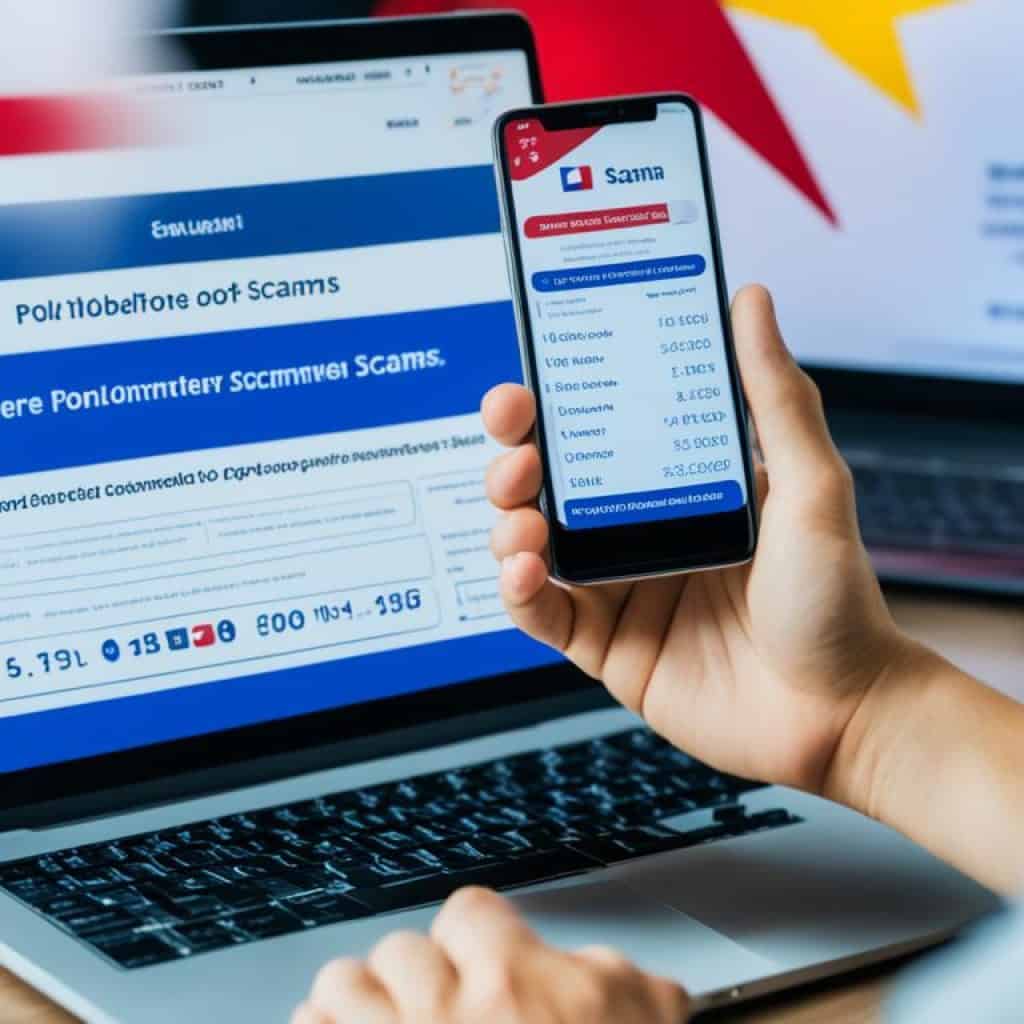Have you ever wondered what legal actions you can take against scammers in the Philippines? Are you curious about how you can pursue scammers legally and protect your rights as a victim? It’s time to unravel the mysteries behind legal remedies and learn how you can fight back against these fraudulent schemes.
Scammers prey on unsuspecting individuals, causing financial losses and emotional distress. However, there are laws and legal frameworks in place to hold them accountable for their actions. By understanding the legal rights and remedies available to you, you can take proactive steps towards seeking justice and ensuring that scammers face the consequences of their crimes.
In this article, we will explore the legal actions you can take against scammers in the Philippines, the types of scams prevalent in the country, and the challenges you may encounter when pursuing legal actions. We will also discuss the importance of collecting evidence and reporting scams to the relevant authorities to initiate investigations.
Are you ready to arm yourself with knowledge and take a stand against scammers? Let’s delve into the legal world and uncover the strategies and legal options available to overcome these fraudulent schemes.
Key Takeaways:
- There are various legal actions you can take against scammers in the Philippines.
- Understanding the legal framework against scams and the different types of scams is crucial.
- Filing criminal charges, pursuing civil suits for damages, and filing administrative complaints are among the legal remedies available.
- Collecting evidence can be challenging, but it is essential in building a strong case against scammers.
- Reporting scams to the relevant authorities initiates investigations and helps protect others from falling victim to fraud.
Legal Framework Against Scams in the Philippines
Scams in the Philippines are governed by several criminal statutes, including the Revised Penal Code, the Cybercrime Prevention Act, and the Consumer Act. These laws provide a robust legal framework to combat fraudulent practices and ensure that scammers are held accountable. Understanding the legal framework is essential for victims seeking justice and compensation for the damages they have suffered.
The Revised Penal Code serves as the primary legal basis for prosecuting scammers and addressing fraudulent activities. It defines various offenses related to fraud, such as estafa (deceit) and swindling, and prescribes corresponding penalties. By relying on the Revised Penal Code, victims can pursue criminal charges against scammers.
In addition to the Revised Penal Code, the Cybercrime Prevention Act specifically addresses scams and fraud committed through electronic means. This law recognizes the evolving landscape of scams in the digital age and provides authorities with the necessary tools to investigate and prosecute cybercriminals.
The Consumer Act, on the other hand, focuses on protecting consumers’ rights and interests. It establishes standards for fair trade practices, ensuring that consumers are not deceived or misled by false claims or fraudulent schemes. Victims of scams that involve consumer transactions can leverage the Consumer Act to pursue legal remedies and seek compensation.
By enacting and enforcing these laws, the Philippine legal system aims to deter scammers and minimize their impact on individuals and businesses. The legal framework against scams empowers victims to take legal action and sends a clear message that fraudulent activities will not be tolerated.
Having a comprehensive understanding of the legal framework against scams is essential when pursuing legal remedies. Victims should consult with legal professionals who can provide guidance on the specific laws applicable to their case and assist in building a strong legal strategy.
Key Laws Against Scams in the Philippines
| Law | Purpose |
|---|---|
| Revised Penal Code | Establishes criminal offenses related to fraud and prescribes corresponding penalties |
| Cybercrime Prevention Act | Addresses scams and fraud committed through electronic means |
| Consumer Act | Protects consumers’ rights and interests, ensuring fair trade practices |
Types of Scams
Scams come in various forms, targeting individuals both offline and online. It is important to understand the different types of scams to effectively combat them and take appropriate legal action. Scammers employ deceptive tactics to lure victims into their schemes, using offline methods such as Ponzi schemes, fraudulent sales, and confidence tricks. These scams often involve false promises of high returns on investments or the sale of counterfeit products.
Online scams, on the other hand, exploit the digital landscape to defraud unsuspecting individuals. Phishing scams aim to steal personal information, such as login credentials or financial details, by mimicking legitimate websites or email communications. Online auction fraud occurs when fraudulent sellers fail to deliver goods or misrepresent items being sold. Advance-fee fraud schemes trick victims into making upfront payments or providing financial assistance under false pretenses.
Understanding the nature of the scam is crucial in determining the legal action to be taken. Different types of scams fall under distinct legal frameworks, with specific laws and provisions relevant to each. By identifying the specific scam involved, victims can better navigate the legal system and pursue the appropriate remedies and consequences for the scammers.
| Type of Scam | Description |
|---|---|
| Ponzi Scheme | A fraudulent investment scheme that pays returns to early investors using funds contributed by new investors, rather than from profit earned. |
| Fraudulent Sales | The sale of counterfeit or non-existent products, often accompanied by false claims or misrepresentations. |
| Confidence Trick | A scheme that involves gaining the trust of a victim and exploiting that trust to deceive and defraud. |
| Phishing | An online scam that attempts to trick individuals into disclosing sensitive information through fraudulent websites or emails. |
| Online Auction Fraud | The misrepresentation of items for sale or failure to deliver purchased goods in online auctions or marketplaces. |
| Advance-Fee Fraud | A scheme that requires victims to make upfront payments or provide financial assistance in exchange for promised rewards or benefits that never materialize. |
Legal Remedies Against Scammers
When you fall victim to a scam in the Philippines, it is essential to know that there are legal remedies available to seek justice and claim compensation. Pursuing legal action against scammers can not only hold them accountable but also serve as a deterrent for future fraudulent activities. Here are some key legal options to consider:
Filing Criminal Charges
One of the most direct approaches to deal with scammers is to file criminal charges against them. This involves gathering sufficient evidence to support your case and then lodging a complaint with the appropriate law enforcement agencies. By doing so, you help initiate a formal investigation and provide the authorities with the necessary information to take action.
Pursuing a Civil Suit for Damages
If you have suffered financial losses or emotional distress due to a scam, you can also consider pursuing a civil suit for damages. This legal action allows you to seek compensation for the harm caused by the scammer. It is important to consult with an attorney who specializes in scam-related cases to understand the legal process and assess the chances of success.
Filing Administrative Complaints
In certain cases, particularly those involving regulated industries, victims can file administrative complaints against scammers. Regulatory agencies have the power to impose fines, suspend licenses, or take other appropriate actions against individuals or businesses involved in fraudulent activities. These administrative complaints can provide an alternative avenue for seeking redress and ensuring that scammers are held accountable.
By utilizing these legal remedies, you can take an active stand against scammers and protect both your rights and the rights of others. Remember, seeking legal assistance and cooperating with law enforcement agencies are crucial steps toward achieving justice and deterring future scams.

Evidentiary Concerns in Suing Scammers
One of the most significant challenges in taking legal action against scammers is the collection of evidence. Evidentiary concerns arise due to scammers’ deceptive practices, including the use of fake identities and untraceable modes of communication.
Scammers are skilled at concealing their true identities and employing untraceable methods of communication, such as disposable phone numbers or encryption technologies. These tactics make it difficult for victims to gather compelling evidence to build a strong case against scammers.
However, it is crucial for victims to preserve any correspondence, transactions, or other forms of evidence that can be used in court. This includes screenshots of text messages, emails, or any other written communication exchanged with the scammer. Additionally, victims should keep records of financial transactions, such as bank statements or wire transfer receipts, to demonstrate the financial impact of the scam.
Preserving correspondence and gathering comprehensive evidence is crucial in establishing the credibility of the victim’s claims and providing the necessary information for legal proceedings.
Furthermore, victims should consider seeking professional legal advice to navigate the legal complexities and identify suitable channels for collecting evidence and pursuing legal action against scammers.
“Preserving correspondence and gathering comprehensive evidence is crucial in establishing the credibility of the victim’s claims and providing the necessary information for legal proceedings.”
The challenges associated with collecting evidence necessitate a proactive approach from victims. By diligently preserving correspondence and maintaining records of transactions, victims increase their chances of successfully pursuing legal remedies against scammers.
Evidence Collection Checklist
| Types of Evidence | Description |
|---|---|
| Correspondence | Screenshots or copies of text messages, emails, and other written communication with the scammer |
| Financial Transactions | Bank statements, wire transfer receipts, or other evidence of financial transactions related to the scam |
| Website Screenshots | Capturing images of scam websites or online advertisements used by scammers |
| Photographic Evidence | Photographs of physical products or locations relevant to the scam |
| Witness Statements | Written statements from individuals who have information or witnessed the scam |
Collecting and organizing evidence using the checklist above can strengthen the victim’s case and increase the likelihood of successful legal action against scammers.
Cybercrime and Jurisdictional Issues
When scams occur online, jurisdictional issues may complicate legal proceedings, particularly when the scammer is located outside of the Philippines. However, the Cybercrime Prevention Act empowers Philippine authorities to assert jurisdiction if the cybercrime is committed within the country’s borders or if the victim is a Filipino citizen.
Jurisdictional issues in cybercrime cases arise due to the global nature of the internet, making it challenging to track down and prosecute scammers operating across international borders. Scammers often take advantage of the anonymity and geographical distance provided by the internet, making it difficult for law enforcement agencies to identify and apprehend them.
Despite these challenges, the Cybercrime Prevention Act provides a legal framework to address and combat cybercrimes effectively. The Act criminalizes various cyber offenses, such as hacking, online fraud, identity theft, and phishing, establishing jurisdiction even when the perpetrator is outside the Philippines.
In cases where the scammer is located within Philippine jurisdiction, law enforcement agencies can collaborate with international counterparts through channels such as mutual legal assistance treaties to facilitate the investigation, arrest, and extradition of the cybercriminal.
Furthermore, victims of cybercrimes must be aware of the statute of limitations when seeking legal remedies. The length of the statute of limitations varies based on the specific nature of the cybercrime offense and the legal action being pursued. It is crucial for victims to consult with legal professionals to ensure they file their complaints and initiate legal proceedings within the designated timeframes.
As cybercrime continues to evolve and increase in sophistication, international collaboration and efforts between governments, law enforcement agencies, and internet service providers are essential to combat these criminal activities effectively. By staying informed and vigilant, individuals can protect themselves from falling victim to cybercrimes and contribute to a safer digital environment.
Reporting Scams to Relevant Authorities
Reporting scams to the appropriate authorities is a crucial step in combating fraudulent activities and seeking justice. By reporting scams, you not only help to initiate investigations but also contribute to the prevention of future scams and protect others from falling victim to similar schemes.
If you have been targeted or have fallen victim to a scam in the Philippines, there are several key authorities that you can reach out to:
- The National Bureau of Investigation (NBI) has a dedicated Cybercrime Division that investigates and takes action against various cybercrimes, including online scams. They have the expertise and resources to handle these cases effectively.
- The Philippine National Police Anti-Cybercrime Group (PNP-ACG) specializes in combating cybercrimes and has the necessary tools and capabilities to investigate and apprehend scammers.
- The Department of Trade and Industry (DTI) provides assistance to victims of scams, especially those involving fraudulent businesses or individuals operating in the commercial sector.
- The Securities and Exchange Commission (SEC) also plays a vital role in handling scams related to investments and securities, ensuring the protection of investors and maintaining the integrity of the financial market.
When reporting a scam, it is important to provide as much detailed information as possible. This includes the nature of the scam, any evidence or documentation you may have, and any relevant contact information or online accounts associated with the scammer.
Remember, by reporting scams, you not only help yourself but also contribute to a safer online environment for everyone. Together, we can take a stand against scammers and protect the rights and interests of individuals in the Philippines.

Government Efforts to Combat Scams
The Philippine government is committed to protecting the public from scams and fraudulent activities. The Department of Finance (DOF) plays a crucial role in spearheading these efforts and collaborating with anti-cybercrime authorities and other law enforcement agencies.
The DOF works diligently to track down scammers and bring them to justice. By closely collaborating with anti-cybercrime authorities, such as the National Bureau of Investigation (NBI) and the Philippine National Police Anti-Cybercrime Group (PNP-ACG), the government can effectively combat scams and safeguard the interests of the public.
In addition to working with law enforcement agencies, the government also engages with social media platforms and online ad companies. It actively monitors and tracks fake posts that endorse scams, taking swift action to remove them from circulation.
Through these collaborative efforts, the government aims to create a safe and secure online environment for Filipinos. By tracking down scammers and removing fraudulent content, the government seeks to protect individuals from falling victim to scams and promote a culture of trust and transparency.
Conclusion
Scams are a serious concern, but the legal system in the Philippines provides avenues for victims to seek justice and protect their rights.
While there are challenges in taking legal action against scammers, such as evidentiary concerns and jurisdictional issues, various laws and legal remedies are available.
It is important for victims to be vigilant and report scams to the relevant authorities, such as the National Bureau of Investigation and the Philippine National Police Anti-Cybercrime Group.
Consulting with lawyers can help victims understand their legal options and navigate the process of seeking justice.
By pursuing legal actions against scammers, victims not only seek justice for themselves but also contribute to the overall protection of rights for everyone in society.
Remember, protecting your rights and seeking justice is not only crucial for yourself but also acts as a deterrent for scammers, making the Philippines safer for everyone.
“The legal system provides a framework for victims to seek justice and hold scammers accountable. By taking legal action, victims protect their rights and contribute to the overall safety of society.”
Protecting your Rights and Seeking Justice: A Step-by-Step Guide
- Document and preserve all evidence related to the scam, including screenshots, emails, and financial transactions.
- Report the scam to the relevant authorities, such as the National Bureau of Investigation and the Philippine National Police Anti-Cybercrime Group.
- Consult with a lawyer to understand your legal options and determine the best course of action.
- File a complaint or initiate legal proceedings, whether criminal charges, a civil suit, or an administrative complaint, depending on the nature of the scam and the available legal remedies.
- Stay updated on the progress of your case and cooperate with law enforcement authorities and lawyers throughout the process.
Legal Actions Against Scammers
| Legal Action | Description |
|---|---|
| Filing Criminal Charges | Report the scam to law enforcement agencies to initiate a criminal investigation and prosecution. |
| Initiating a Civil Suit | File a civil suit to seek damages and financial compensation for the losses incurred due to the scam. |
| Filing Administrative Complaints | Submit complaints to regulatory agencies for industries that are regulated, such as the Department of Trade and Industry and the Securities and Exchange Commission. |
Dealing with Online Scams in the Philippines: Legal Measures and Remedies
With the rise of online scams, it is essential to be aware of the legal measures and remedies available in the Philippines. The Cybercrime Prevention Act of 2012 is a key law that addresses cybercrime, including online scams. By familiarizing yourself with this law, you can better understand your rights and the legal actions you can take to protect yourself.
In dealing with online scams, gathering sufficient evidence is crucial. Keep records of any fraudulent activities, such as emails, messages, or transactions, as this evidence will be important if you decide to pursue legal action. Reporting scams promptly to the appropriate authorities, such as the National Bureau of Investigation and the Philippine National Police Anti-Cybercrime Group, can help initiate investigations and potentially lead to the prosecution of scammers.
The Department of Trade and Industry and the Securities and Exchange Commission are also valuable resources in cases involving online scams. These agencies provide assistance and guidance to victims, ensuring that their rights are protected and that appropriate actions are taken against scammers. Taking advantage of their expertise can significantly increase your chances of obtaining justice and recovering any financial losses.
Remember, the fight against online scams requires collective effort. Stay informed about the latest scam tactics, educate your friends and family to raise awareness, and report any suspicious activities promptly. By taking these proactive steps, you not only protect yourself but also contribute to the prevention of cybercrime in the Philippines.

By understanding the legal measures and remedies available and staying vigilant, you can effectively combat online scams and protect yourself from falling victim to fraudulent activities.
Stop Seeing Ads Endorsing Fake Cryptocurrency Schemes
The Department of Finance (DOF) in the Philippines is taking action against the proliferation of false information spread through online ads endorsing fake cryptocurrency schemes. These scams mislead individuals by promising high returns or exclusive investment opportunities, preying on their desire to make quick profits in the booming cryptocurrency market.
The DOF urges the public to exercise caution and skepticism when encountering such ads, as they are often vehicles for scams and false information. It is important to remember that legitimate investment opportunities are carefully regulated and require thorough research and due diligence. Individuals should be wary of schemes that promise unrealistic returns or guarantee profit.
The government is actively collaborating with anti-cybercrime authorities and online platforms to track down and remove these fake posts. However, the public’s cooperation is crucial in reporting such ads to the DOF and relevant law enforcement agencies. By reporting these scams, individuals contribute to the prevention of further victimization and help in the prosecution of scammers.
Protect yourself:
- Exercise caution when encountering ads endorsing fake cryptocurrency schemes.
- Do not provide personal information or invest in schemes without conducting thorough research.
- Report suspicious ads to the Department of Finance and relevant law enforcement agencies.
“The Department of Finance is committed to protecting the public from scams and false information. We encourage everyone to remain vigilant and report any suspicious activity to us. Together, we can create a safer digital environment for all.” – Secretary of Finance
| Signs of Fake Cryptocurrency Schemes: | How to Protect Yourself: |
|---|---|
| The promise of unrealistically high returns | Research the scheme and verify its legitimacy |
| Guarantees of profit or risk-free investments | Seek advice from financial professionals before investing |
| Lack of transparency or refusal to disclose information | Verify the scheme’s licenses and registrations |
| Pressure to invest quickly or limited availability | Take your time and consult with trusted advisors |
Wealth Coach Chinkee Tan Imparts Wais/Tipid Tips In The “New Normal”
As we navigate the “new normal” in the Philippines, it’s essential to manage our finances wisely and protect ourselves from scams. Wealth Coach Chinkee Tan, a renowned financial expert, offers valuable tips and advice to help us thrive in these challenging times.
Practicing Financial Discipline
One of the most crucial financial tips Coach Chinkee Tan emphasizes is the importance of practicing financial discipline. This includes creating a budget and sticking to it, avoiding unnecessary expenses, and making wise financial decisions. By establishing a strong foundation of discipline, we can ensure our financial stability and reach our long-term goals.
Creating an Emergency Fund
Another valuable tip Coach Chinkee Tan shares is the importance of creating an emergency fund. In uncertain times, having a financial safety net can provide peace of mind and protect us from unexpected expenses or income loss. Setting aside a portion of our income regularly can help us build a fund that can cover at least three to six months of living expenses.
Being Vigilant Against Scams
With the rise of scams and fraudulent activities, it is crucial to be vigilant in protecting our hard-earned money. Coach Chinkee Tan highlights the significance of scam prevention by educating ourselves about different types of scams and learning how to identify red flags. By staying informed and cautious, we can avoid falling victim to scams and financial fraud.
“Education is key when it comes to protecting ourselves from scams. By staying informed and being aware of the risks, we can make better financial decisions and safeguard our wealth.” – Wealth Coach Chinkee Tan
Navigating the “New Normal”
Coach Chinkee Tan’s Wais/Tipid tips provide us with practical strategies to navigate the “new normal” in the Philippines. By practicing financial discipline, creating an emergency fund, and being vigilant against scams, we can adapt and thrive in these challenging times and secure our financial future.
| Wais/Tipid Tips by Coach Chinkee Tan: |
|---|
| 1. Create a budget and stick to it. |
| 2. Set aside a portion of your income for an emergency fund. |
| 3. Educate yourself about different types of scams and stay vigilant. |
Simple Money Skills to Master Amid the Pandemic
The ongoing pandemic has brought financial challenges to many individuals and households. To navigate these uncertain times effectively, it is crucial to develop and master simple money skills. By doing so, you can better manage your finances, protect yourself against scams, and make informed decisions.
One essential money skill to focus on is budgeting. Assess your income and expenses to create a realistic budget that covers your essential needs while accounting for savings and debt payments. A well-planned budget can help you prioritize your spending, track your expenses, and ensure that you are saving for the future.
In addition to budgeting, prioritize saving money. Even if you can only set aside a small amount each month, the habit of saving is crucial. Building an emergency fund can provide a much-needed financial cushion during unexpected events, such as job loss or medical emergencies. Consider automating your savings to make it easier to consistently save a portion of your income.
Lastly, be aware of common scams and practice caution when dealing with financial matters. Scammers often take advantage of people’s vulnerability during challenging times. Stay informed about the latest scams and learn how to identify red flags. Never share sensitive personal or financial information with unknown entities through email or phone calls. Being vigilant and skeptical can help you avoid falling victim to fraudulent activities.
FAQ
What legal actions can I take against scammers in the Philippines?
You can take several legal actions against scammers in the Philippines, including filing criminal charges, initiating a civil suit for damages, and filing administrative complaints.
What is the legal framework against scams in the Philippines?
Scams in the Philippines are governed by various laws, including the Revised Penal Code, the Cybercrime Prevention Act, and the Consumer Act.
What are the types of scams in the Philippines?
Scams can be offline or online. Offline scams include Ponzi schemes, fraudulent sales, and confidence tricks. Online scams encompass activities such as phishing, online auction fraud, and advance-fee fraud.
What legal remedies are available against scammers?
Victims of scams can pursue criminal charges, civil suits for damages, or file administrative complaints, depending on the nature of the scam and the desired outcome.
What are the evidentiary concerns when suing scammers?
One of the challenges in taking legal action against scammers is collecting sufficient evidence. Scammers often use fake identities and untraceable modes of communication, making it important to preserve any correspondence and transactions.
What are the jurisdictional issues in cybercrime cases?
Jurisdictional issues may arise in cybercrime cases when scammers are located outside of the Philippines. However, the Cybercrime Prevention Act grants Philippine authorities the power to assert jurisdiction if the act is committed within the country or if the victim is a Filipino citizen.
Who should I report scams to?
You should report scams to the relevant authorities, such as the National Bureau of Investigation (NBI), the Philippine National Police Anti-Cybercrime Group (PNP-ACG), the Department of Trade and Industry (DTI), or the Securities and Exchange Commission (SEC).
What efforts does the Philippine government make to combat scams?
The Department of Finance (DOF) collaborates with anti-cybercrime authorities and other law enforcement agencies to track down and prosecute scammers. The government also works with online platforms to remove fake posts endorsing scams.
What legal measures and remedies are available against online scams?
The Cybercrime Prevention Act provides legal measures to combat online scams. You can report scams to the NBI, PNP-ACG, DTI, or SEC, who can initiate investigations and take appropriate legal action.
How can I stop seeing ads endorsing fake cryptocurrency schemes?
If you come across ads endorsing fake cryptocurrency schemes, you should report them to the DOF and relevant law enforcement agencies. The government is actively working to track down and remove these fake posts.
What tips can Wealth Coach Chinkee Tan provide to navigate the “new normal”?
Wealth Coach Chinkee Tan advises practicing financial discipline, creating an emergency fund, and being vigilant against scams to navigate the “new normal” in the Philippines.
What money skills should I master amid the pandemic?
Amid the pandemic, it is crucial to master money skills such as budgeting, saving, and investing wisely. Additionally, being aware of common scams and practicing caution when dealing with financial matters is essential.







Add comment